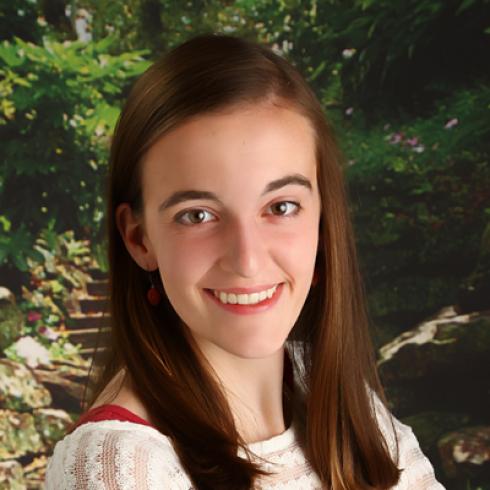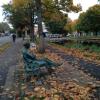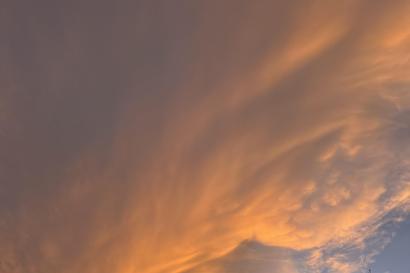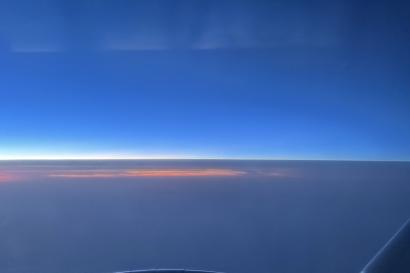**Someone was calling. “Nor-ry. Nor-ry Ry-an.”**
Driving through the Adirondacks, we pass a big banner stretched across a storefront that reads, in red, white, and blue, “God Bless America.”
“I can’t stand that,” my mother says, and we drive on, over rolling hills and under tiny bridges, gliding past cornfields and corner gas stations. As we traverse through upstate New York together, I know: it’s not America she can’t stand, and it certainly isn’t God. It’s the idea that God is one specific thing, and that the country He (because it would be He here, wouldn’t it?) blesses is one specific, exclusionary, “exceptional” thing, too.
**With that the sun came out between the cloud and the hill, and it shining green in my face. ‘God have mercy on your soul,’ says he, lifting a scythe. ‘Or on your own,’ said I, raising the loy.**
Less than two weeks later, I am sitting in the corner of a Mexican restaurant in the sweltering heat of Houston, Texas, and my aunt reaches out a hand to me. It is time to say grace. We bless our food and our family, and then, without breaking rhythm, my aunt adds, “God Bless America.”
**Priest: In the name of the Father, and of the Son, and of the Holy Spirit. [All together make the sign of the cross.] All: Amen.**
Before either of those encounters, sitting in my room on a warm summer night, I read an essay by David Foster Wallace entitled, “Joseph Frank’s Dostoyevsky.” In it, he writes, “What is ‘an American’? Do we have something important in common, as Americans, or is it just that we all happen to live inside the same boundaries and obey the same laws? How exactly is America different from other countries? Is there really something unique about it?”
Some days, I think there is, and other days, I think there isn’t, and some days, I think that Americans are uniquely exceptional only in their belief that they are such. But the truth is that I don’t really know, and I’m not sure that I can know. After all, I have only lived in America. The sum total of my time spent abroad adds up to hardly more than a month of my twenty years.
**I felt a burnin’ lump in me throat when I heard th’ band playin’ ‘The Soldiers’ Song,’ rememberin’ last hearin’ it marchin’ in military formation, with th’ people starin’ on both sides at us, carrin’ in us th’ pride an’ resolution o’ Dublin to the grave of Wolfe Tone.**
The question of what America is—great or grating, excellent or exclusionary, outstanding or ordinary—seems peculiarly relevant to me right now, as I type at my computer on the very day that I am set to leave for Dublin, Ireland. I’ll be studying abroad there for the next three and a half months in the IES Dublin Writer’s Program. Just as interesting, just as important, to me right now is the parallel question to the one Wallace raises: What are other countries? What is Ireland? After all, maybe you can’t ever figure out what your own country is without some knowledge of another. It’s surely no accident that Wallace’s questions about American identity are submerged within an essay on a Russian writer.
It’s true that Wallace seeks to separate the two subjects by the means of asterisks, which suffuse his essay the same way that they clutter mine, trying to differentiate, trying to order. Integrating the two topics, finding some answer to Americanness, seems hopelessly difficult to Wallace, especially in light of what he believes to be the blindnesses and biases of postmodern discourse. I, too, find myself at a loss to define America. I am even less able to articulate Ireland. I could spend almost infinite pages detailing the contradictions of (my) American experience, whereas I’ve already exhausted most of what I could list under the heading “Irish.” As it turns out, it is hardly more than a bit of Patricia Reilly Giff’s Nory Ryan’s Song, J.M. Synge’s The Playboy of the Western World, Sean O’Casey’s The Plough and the Stars, and a snippet of Catholic mass, the last because Ireland is a country that was once deeply defined, at least according to the textbooks, by Catholic orthodoxy, and may still be, and may not.
I hope that in three and a half months, I’ll have more to say on these questions. At the very least, I hope I might someday be able to approach them more directly, to not be so hindered by the boundaries of anecdote, by my own inability to put my thoughts to words. Perhaps, as David Foster Wallace believed, it is astronomically harder to answer questions about being, about identity, in the postmodern world, but I prefer to turn here to the words of an Irish writer, Samuel Beckett, who I first discovered in an essay by an American. It’s these words I’ll cling to these next few months, as I begin my writing classes, begin my time abroad, for they seem to me to be suffused in the wisdom of both writing and life:
“Ever tried. Ever failed. No matter. Try again. Fail again. Fail better."

Chelsea Thomeer
I'm a rising junior at Williams College majoring in English and political science. I love reading and running, Jane Austen and J.K. Rowling, pumpkin bread and pretzels, The Grapes of Wrath and green tea. I'm spending a semester in Ireland to study Irish literature and to work on my own writing.








